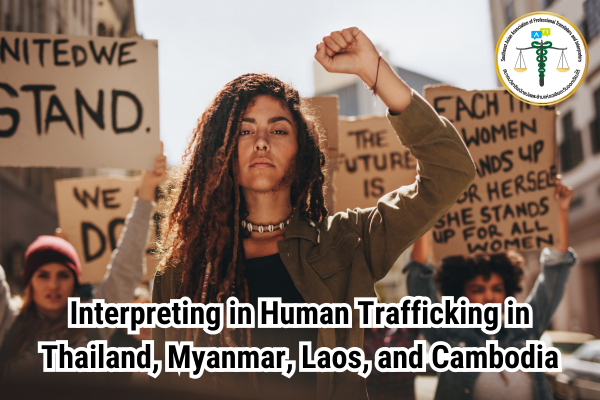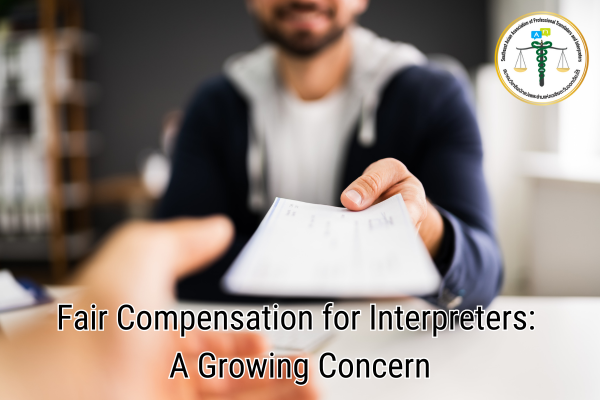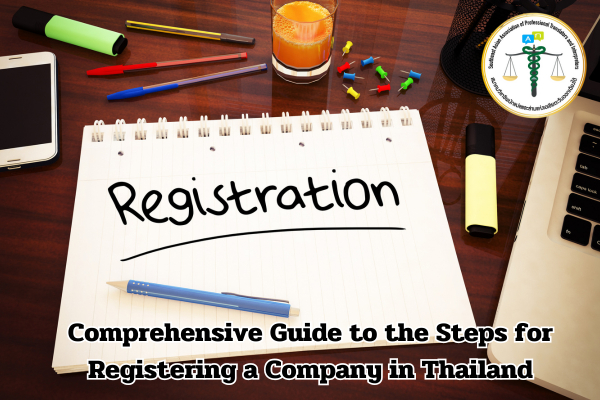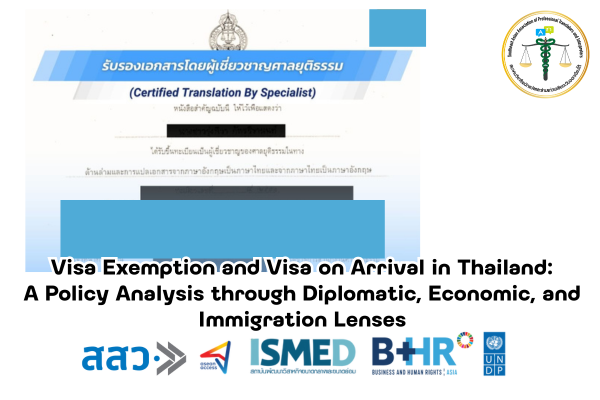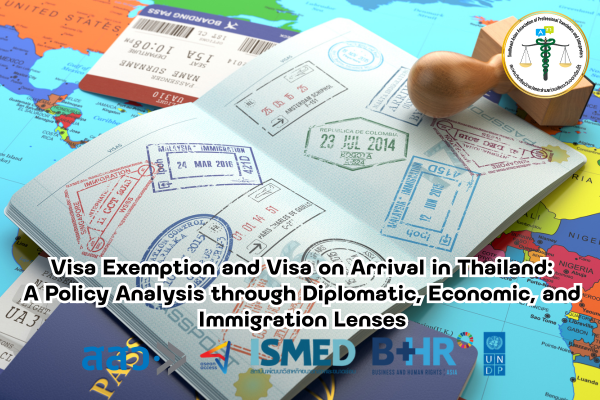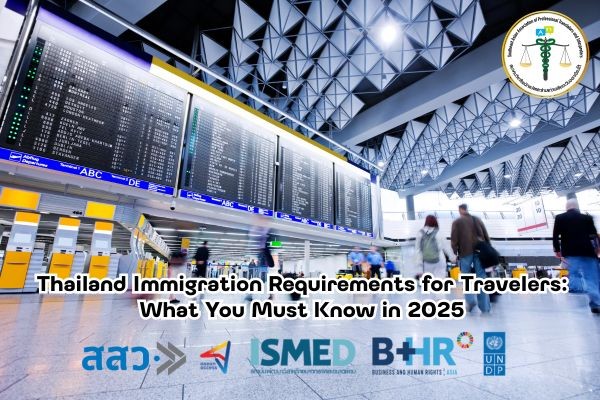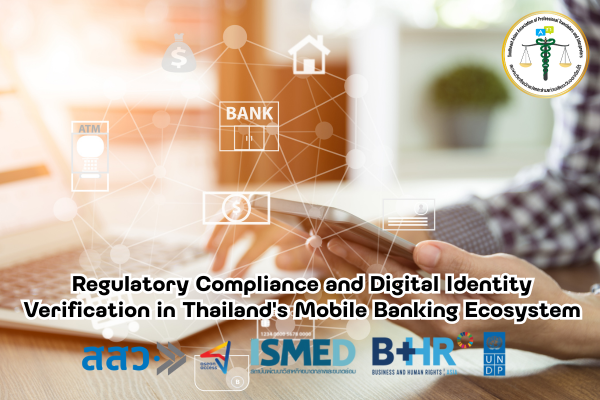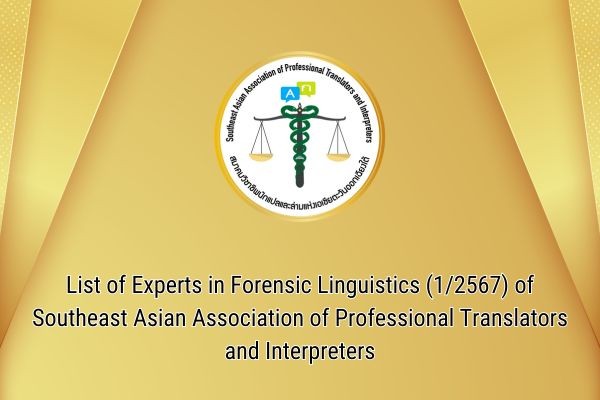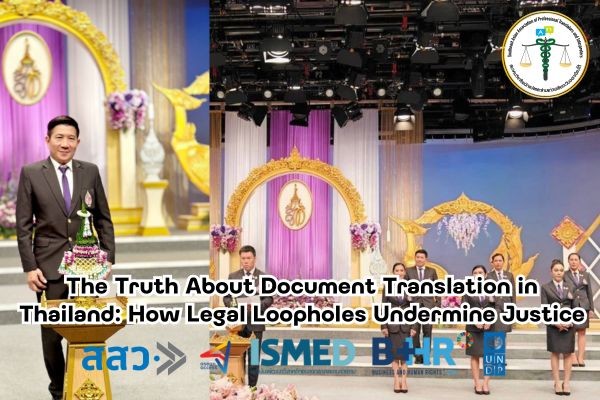Interpreting in Human Trafficking in Thailand, Myanmar, Laos, and Cambodia: Professional Guidelines and Ethical Standards for Certified Interpreters
11 January 2025, Bangkok – Human trafficking is a significant issue that impacts the economy, society, and humanity at a regional level, especially in Thailand, Myanmar, Laos, and Cambodia, which are interconnected as source, transit, and destination countries. For victims of human trafficking, interpreters play a crucial role in connecting them with justice processes, healthcare services, and rehabilitation efforts. This article discusses the role of interpreters in human trafficking contexts, professional guidelines, and ethical standards for certified interpreters supported by the Southeast Asian Association of Professional Translators and Interpreters (SEAProTI).
Roles of Interpreters in Human Trafficking Cases
-
Facilitating Communication Between Victims and State Authorities
Interpreters assist victims in communicating effectively with police, prosecutors, courts, and other officials involved in justice processes. Accurate information is critical to case proceedings and protecting victims’ rights. -
Providing Psychological and Rehabilitation Support
Victims of human trafficking often face complex psychological challenges. Interpreters work with psychologists, social workers, or medical personnel to provide comprehensive care for victims. -
Assisting with Document Translation and Key Information
Interpreters may help translate documents such as passports, statements, or other relevant materials to ensure smooth and efficient processes. -
Working Across Cultural Contexts
Interpreters must not only translate languages but also understand the victim’s cultural background to prevent miscommunication and build trust between victims and officials.
Guidelines for Professional Interpreting in Human Trafficking
-
Specialized Training
Interpreters should receive training on human trafficking issues, cultural sensitivity, and victims’ psychological aspects to prepare for working in complex situations. -
Proficiency in Local Languages
In Thailand, Myanmar, Laos, and Cambodia, interpreters should be proficient in Thai, Burmese, Lao, Khmer, and other relevant local languages. -
Collaborating with Multidisciplinary Teams
Interpreters should work closely with police, legal professionals, social workers, and healthcare providers to deliver comprehensive support for victims. -
Managing Stress and Pressure
Interpreting in human trafficking contexts can be stressful and demanding. Interpreters must have strategies to manage their stress to maintain work quality.
Ethical Standards for Certified Interpreters
The Southeast Asian Association of Professional Translators and Interpreters (SEAProTI) plays a significant role in establishing professional standards and ethical codes for certified interpreters in the region. Key principles include:
-
Confidentiality
Interpreters must strictly maintain the confidentiality of victims to protect their rights and safety. -
Impartiality
Interpreters must remain impartial and refrain from showing bias during their work to ensure accurate and complete communication. -
Respect for Victims’ Dignity
Interpreters should treat victims with respect, avoiding judgmental or dismissive behavior. -
Professional Responsibility
Certified interpreters must perform their duties with the highest competence and responsibility to support justice processes and victim rehabilitation. -
Continuous Professional Development
Certified interpreters should participate in ongoing training and professional development to maintain high standards of work and updated knowledge.
Conclusion
Interpreting in human trafficking in Thailand, Myanmar, Laos, and Cambodia is a complex profession requiring specialized expertise. Adhering to professional guidelines and ethical standards set by SEAProTI enables certified interpreters to perform their roles effectively, building trust and confidence in the justice and rehabilitation processes. This ensures that victims receive genuine assistance and have the opportunity to begin a new life with dignity.
About SEAProTI’s certified translators, translation certification providers, and certified interpreters:
The Southeast Asian Association of Professional Translators and Interpreters (SEAProTI) has officially announced the criteria and qualifications for individuals to register as “Certified Translators,” “Translation Certification Providers,” and “Certified Interpreters” under the association’s regulations. These guidelines are detailed in Sections 9 and 10 of the Royal Thai Government Gazette, issued by the Secretariat of the Cabinet under the Office of the Prime Minister of the Kingdom of Thailand, dated July 25, 2024, Volume 141, Part 66 Ng, Page 100.
To read the full publication, visit: the Royal Thai Government Gazette
การทำล่ามในงานค้ามนุษย์ในประเทศไทย พม่า ลาว และกัมพูชา: แนวทางในการประกอบวิชาชีพและจรรยาบรรณวิชาชีพของล่ามรับรอง (Certified Interpreters)
11 มกราคม 2568, กรุงเทพมหานคร – งานค้ามนุษย์เป็นหนึ่งในปัญหาสำคัญที่ส่งผลกระทบทั้งทางเศรษฐกิจ สังคม และมนุษยธรรมในระดับภูมิภาค โดยเฉพาะในประเทศไทย พม่า ลาว และกัมพูชา ซึ่งมีความเชื่อมโยงกันทั้งในฐานะประเทศต้นทาง ประเทศปลายทาง และประเทศผ่านทาง สำหรับผู้เสียหายจากการค้ามนุษย์ ล่ามถือเป็นบุคคลสำคัญที่ช่วยเชื่อมโยงพวกเขากับกระบวนการยุติธรรม การดูแลสุขภาพ และการฟื้นฟูชีวิตใหม่ ในบทความนี้ เราจะกล่าวถึงบทบาทของล่ามในบริบทของงานค้ามนุษย์ แนวทางในการประกอบวิชาชีพ และจรรยาบรรณวิชาชีพของล่ามรับรองที่ได้รับการสนับสนุนโดยสมาคมวิชาชีพนักแปลและล่ามแห่งเอเชียตะวันออกเฉียงใต้ (SEAProTI)
บทบาทของล่ามในงานค้ามนุษย์
-
การสื่อสารระหว่างผู้เสียหายและเจ้าหน้าที่รัฐ
ล่ามทำหน้าที่ช่วยให้ผู้เสียหายสามารถสื่อสารกับเจ้าหน้าที่ตำรวจ อัยการ ศาล และเจ้าหน้าที่ผู้เกี่ยวข้องในกระบวนการยุติธรรมได้อย่างถูกต้องและครบถ้วน การให้ข้อมูลที่ถูกต้องมีความสำคัญต่อการดำเนินคดี และช่วยปกป้องสิทธิของผู้เสียหาย -
การสนับสนุนด้านจิตวิทยาและการฟื้นฟู
ผู้เสียหายจากการค้ามนุษย์มักเผชิญกับปัญหาทางจิตใจที่ซับซ้อน ล่ามจึงมีบทบาทในการทำงานร่วมกับนักจิตวิทยา นักสังคมสงเคราะห์ หรือแพทย์เพื่อให้การดูแลผู้เสียหายอย่างครอบคลุม -
การช่วยเหลือด้านเอกสารและการแปลข้อมูลสำคัญ
ล่ามอาจต้องช่วยแปลเอกสาร เช่น พาสปอร์ต บันทึกคำให้การ หรือคำแถลงอื่น ๆ เพื่อให้กระบวนการต่าง ๆ เป็นไปอย่างราบรื่นและรวดเร็ว -
การทำงานในบริบทข้ามวัฒนธรรม
ล่ามไม่เพียงแต่แปลภาษา แต่ยังต้องเข้าใจบริบททางวัฒนธรรมของผู้เสียหาย เพื่อป้องกันการสื่อสารผิดพลาดและเสริมสร้างความไว้วางใจระหว่างผู้เสียหายกับเจ้าหน้าที่
แนวทางในการประกอบวิชาชีพล่ามในงานค้ามนุษย์
-
การฝึกอบรมเฉพาะทาง
ล่ามควรได้รับการอบรมเกี่ยวกับประเด็นงานค้ามนุษย์ ความละเอียดอ่อนทางวัฒนธรรม และจิตวิทยาของผู้เสียหาย เพื่อเตรียมพร้อมสำหรับการทำงานในสถานการณ์ที่ซับซ้อน -
ความเชี่ยวชาญในภาษาท้องถิ่น
ในภูมิภาคไทย พม่า ลาว และกัมพูชา ล่ามควรมีความชำนาญในภาษาไทย พม่า ลาว และเขมร รวมถึงภาษาท้องถิ่นอื่น ๆ ที่เกี่ยวข้อง -
การทำงานร่วมกับทีมสหวิชาชีพ
ล่ามควรทำงานอย่างประสานกับเจ้าหน้าที่ตำรวจ นักกฎหมาย นักสังคมสงเคราะห์ และบุคลากรทางการแพทย์ เพื่อให้ความช่วยเหลือผู้เสียหายอย่างครอบคลุม -
การจัดการกับภาวะกดดัน
การทำงานในบริบทของงานค้ามนุษย์อาจสร้างความเครียดและแรงกดดันอย่างมาก ล่ามควรมีทักษะในการจัดการความเครียดของตนเองเพื่อรักษาคุณภาพของการทำงาน
จรรยาบรรณวิชาชีพของล่ามรับรอง (Certified Interpreters)
สมาคมวิชาชีพนักแปลและล่ามแห่งเอเชียตะวันออกเฉียงใต้ (SEAProTI) มีบทบาทสำคัญในการกำหนดมาตรฐานวิชาชีพและจรรยาบรรณวิชาชีพของล่ามรับรองในภูมิภาค แนวทางที่สำคัญได้แก่:
-
การรักษาความลับ
ล่ามต้องรักษาความลับของผู้เสียหายอย่างเคร่งครัด เพื่อป้องกันการละเมิดสิทธิและความปลอดภัยของพวกเขา -
ความเป็นกลาง
ล่ามต้องมีความเป็นกลางและไม่แสดงความลำเอียงในระหว่างการทำงาน เพื่อให้ข้อมูลที่ถูกต้องและครบถ้วน -
การเคารพศักดิ์ศรีของผู้เสียหาย
ล่ามควรปฏิบัติต่อผู้เสียหายด้วยความเคารพ ไม่แสดงท่าทีตัดสินหรือดูหมิ่น -
การปฏิบัติหน้าที่ตามหลักวิชาชีพ
ล่ามรับรองต้องปฏิบัติงานด้วยความชำนาญและความรับผิดชอบสูงสุด เพื่อสนับสนุนกระบวนการยุติธรรมและการฟื้นฟูผู้เสียหาย -
การพัฒนาทักษะอย่างต่อเนื่อง
ล่ามรับรองควรเข้าร่วมการอบรมและพัฒนาวิชาชีพอย่างสม่ำเสมอ เพื่อรักษามาตรฐานการทำงานและความรู้ที่ทันสมัย
ข้อสรุป
การทำล่ามในงานค้ามนุษย์ในประเทศไทย พม่า ลาว และกัมพูชา เป็นงานที่มีความซับซ้อนและต้องอาศัยความชำนาญเฉพาะทางสูง การยึดมั่นในแนวทางประกอบวิชาชีพและจรรยาบรรณวิชาชีพที่กำหนดโดย SEAProTI ช่วยให้ล่ามรับรองสามารถทำงานได้อย่างมีประสิทธิภาพ สร้างความเชื่อมั่นและความไว้วางใจในระบบยุติธรรมและกระบวนการฟื้นฟู เพื่อให้ผู้เสียหายได้รับความช่วยเหลืออย่างแท้จริงและมีโอกาสเริ่มต้นชีวิตใหม่อย่างมีศักดิ์ศรี
เกี่ยวกับนักแปลรับรอง ผู้รับรองการแปล และล่ามรับรองของสมาคมวิชาชีพนักแปลและล่ามแห่งเอเชียตะวันออกเฉียงใต้
สมาคมวิชาชีพนักแปลและล่ามแห่งเอเชียตะวันออกเฉียงใต้ (SEAProTI) ได้ประกาศหลักเกณฑ์และคุณสมบัติผู้ที่ขึ้นทะเบียนเป็น “นักแปลรับรอง (Certified Translators) และผู้รับรองการแปล (Translation Certification Providers) และล่ามรับรอง (Certified Interpreters)” ของสมาคม หมวดที่ 9 และหมวดที่ 10 ในราชกิจจานุเบกษา ของสำนักเลขาธิการคณะรัฐมนตรี ในสำนักนายกรัฐมนตรี แห่งราชอาณาจักรไทย ลงวันที่ 25 ก.ค. 2567 เล่มที่ 141 ตอนที่ 66 ง หน้า 100 อ่านฉบับเต็มได้ที่: นักแปลรับรอง ผู้รับรองการแปล และล่ามรับรอง


